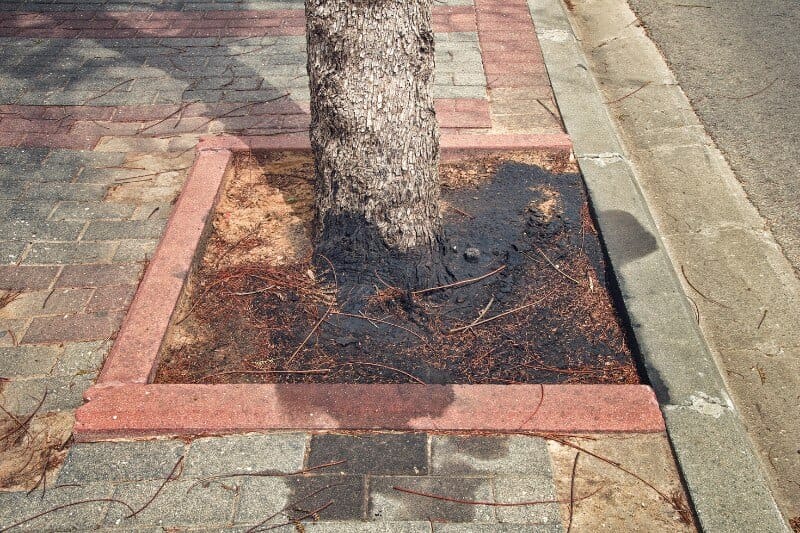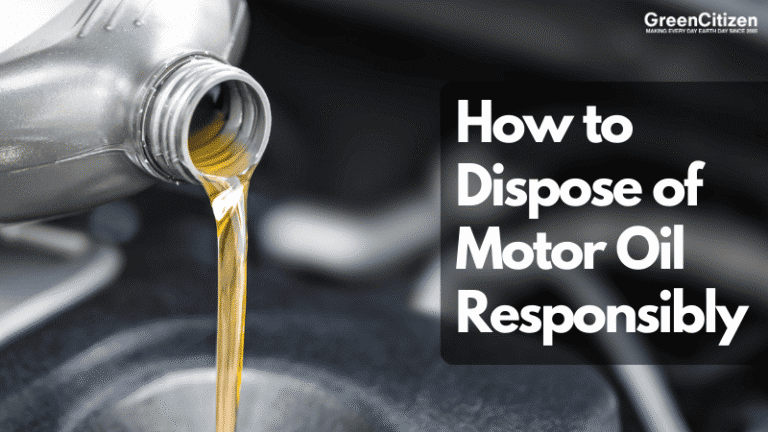Just one gallon of used motor oil can pollute 1 million gallons of drinking water. And yet, people still pour it down the drain, toss it in the trash, or dump it in backyards—causing long-term damage to soil, water, and wildlife.
Used motor oil is hazardous waste, filled with heavy metals and toxic chemicals. Improper disposal isn’t just illegal—it’s a direct threat to the environment.
So how do you dispose of motor oil the right way? Whether you’re dealing with old oil from a DIY change or clearing out your garage, this guide explains how to store used motor oil safely, where to dispose of it, and how to find a recycling center near you.
Knowing how to dispose of used motor oil isn’t just about compliance—it’s about protecting your community and keeping toxic waste out of our water.
Key Takeaway: How to Dispose of Motor Oil Safely
To dispose of motor oil responsibly, store it in a clean, sealed container and take it to a certified oil recycling center, auto parts store, or hazardous waste facility. Never pour it down the drain or into the trash—used motor oil is hazardous waste that must be handled with care to prevent environmental damage.
Do’s and Don’ts for Disposing of Motor Oil
Do’s
Don’ts
- Store used motor oil in a sealed container: Use a clean, leak-proof container to prevent spills and contamination.
- Take it to a certified recycling center: Many local auto parts stores and service stations accept used motor oil for proper recycling.
- Recycle used oil filters too: They often contain residual oil that can be recovered and recycled.
- Label and sort your waste: Clearly label the container as “Used Motor Oil” and keep it separate from other waste materials.
- Check your local regulations: Laws about motor oil disposal vary, so ensure compliance with your area’s guidelines.
- Don’t pour motor oil down the drain: It’s hazardous waste and can contaminate groundwater and harm wildlife.
- Don’t mix used oil with other liquids: Mixing oil with substances like antifreeze or gasoline makes recycling impossible.
- Don’t throw it in the trash: Disposing of motor oil with regular garbage is illegal in many places and harmful to the environment.
- Don’t leave containers open or unprotected: Open containers can spill or attract curious pets and kids, creating safety hazards.
- Don’t wait too long to recycle: Old oil can degrade and become harder to recycle efficiently.
How to Dispose of Motor Oil: A Step-by-Step Guide

To dispose of motor oil properly, collect it in a clean, leak-proof container, seal it tightly, and take it to a certified oil recycling center, auto shop, or hazardous waste facility.
Never pour it down the drain, on the ground, or into the trash.
From safe storage and transportation to finding a nearby drop-off site, here’s how to handle used motor oil the right way.
Step 1: Know When It’s Time for an Oil Change
You can’t dispose of motor oil unless you know when to replace it, right? Most cars need an oil change every 3,000 to 7,500 miles, but driving habits and vehicle type can alter this. If your oil looks dark or gritty on the dipstick or your engine starts sounding rough, it’s probably time.
Proactive oil changes not only keep your engine running smoothly but also prevent environmental hazards caused by leaks from old, degraded oil.
Step 2: Collect Used Oil the Right Way
When draining your car’s oil, preparation is key. Slide a drip pan under the drain plug to catch every drop—no one wants a mess on their driveway.
Remember to wear gloves. Motor oil isn’t just greasy; it’s loaded with toxic substances like heavy metals that aren’t great for your skin (or the environment). Once drained, let the oil settle in the pan while you handle the next steps.
Step 3: Choose the Right Storage Container
Here’s where people often go wrong. Not every container is safe for storing used oil. That leftover milk jug?
Big no!
The residue could contaminate the oil, making it unrecyclable. Instead, use a clean, leak-proof container with a secure lid—many auto parts stores sell purpose-built containers for this. Label it “Used Motor Oil” so no one confuses it for something else.
Yes, people do that!
Step 4: Seal It Tight to Prevent Leaks
Before you consider transporting the oil, double-check your container for cracks or loose lids. Leaks aren’t just messy—they’re a hazard. For extra safety, you can place the container in a plastic bag or secondary bin to contain any potential spills.
Think of it as double-bagging for peace of mind.
Step 5: Find a Certified Recycling Center
Now comes the question: where should you take it? The Green Directory makes this easy. Just type in your zip code, and voilà—you’ll get a list of nearby certified recycling centers, auto parts stores, or service stations that accept used motor oil.
Many places even recycle oil filters, so bring those along. Not only are you keeping the environment clean, but you’re also ensuring the oil gets re-refined into new products. Win-win.
Step 6: Transport the Oil Safely
Transporting motor oil isn’t as daunting as it sounds. Keep the container upright and place it on a stable, non-slip surface in your trunk.
Extreme heat can weaken plastic, so avoid leaving it in a hot car for long. If you’re worried about spills, line your trunk with an old towel or cardboard for extra protection.
Step 7: Don’t Forget Oil Filters and Extras
Here’s a little-known fact: oil filters still contain residual oil that can be recycled. Let the filter drain upside down overnight, then store it in a separate container.
Many recycling centers will take both the oil and the filters, so why not make one trip for everything?

Read More:
Where to Recycle Motor Oil?

Disposing of motor oil responsibly is only half the story—knowing where to take it is the key to closing the loop. Luckily, plenty of options exist, making motor oil recycling easier than ever.
Here’s a breakdown of the best places to drop off used motor oil.
1. Local Auto Parts Stores
Chains like AutoZone, Advance Auto Parts, and O’Reilly Auto Parts are your go-to destinations. These stores often accept used motor oil and oil filters free of charge, as part of their commitment to environmental responsibility.
Bonus: many of them also sell oil storage containers if you need a sturdy option.
2. Recycling Centers
Your city or county recycling center is another reliable option. These facilities are equipped to handle hazardous waste like motor oil and ensure it’s processed safely.
Use tools like the Green Directory to find a certified recycling center near you. Just type in your location, and you’ll have options in seconds.
3. Walmart Auto Care Centers
Yes, you read that right—Walmart. Reddit users swear by Walmart for hassle-free motor oil recycling. Just call ahead to confirm the service and any specific requirements. While you’re there, you might even stock up on fresh oil for your next change.
4. Service Stations
Some gas stations with attached service centers accept used motor oil. Brands like Jiffy Lube often provide recycling services as part of their routine maintenance offerings. It’s worth asking when you stop by for your next tune-up.
5. Curbside Recycling Programs
In certain areas, curbside recycling programs accept used motor oil. Typically, these programs require the oil to be in a leak-proof container, clearly labeled, and placed separately from other recyclables.
Check with your local waste management service to see if this option is available.
6. Community Collection Events
Some municipalities host hazardous waste collection events where residents can drop off items like motor oil, oil filters, and other automotive waste. Keep an eye on your city’s website for upcoming events in your area.
Pro Tip for a Hassle-Free Motor Oil Disposal
Before heading out, double-check the facility’s guidelines. Some places limit the quantity of oil you can bring in one visit (usually 5 gallons). Also, confirm whether they accept used oil filters or other automotive fluids.
With so many convenient options—from Walmart to local auto parts stores—there’s no excuse for improper disposal. Choose a location near you, and let’s keep that motor oil out of the environment and into the recycling loop!
What Happens to Recycled Motor Oil?
Recycling centers clean motor oil by removing dirt, metals, and toxins. This process prepares the oil for reuse. Most recycled oil becomes re-refined motor oil that works as well as new oil. Factories also use recycled oil to make re-refined motor oil, industrial lubricants, or heating fuel.
Re-refined oil is just as good as new motor oil, meeting the same high standards while reducing the need for crude oil extraction. Industrial applications use it to keep machinery running smoothly, and some facilities convert it into heating fuel.
Every gallon of recycled motor oil saves natural resources and prevents pollution—just one gallon can contaminate up to a million gallons of water if dumped.
Why Shouldn’t You Dump Motor Oil in The Open?

What’s the big deal about dumping motor oil? It’s just oil, right? Not exactly. Used motor oil is packed with harmful chemicals and pollutants that can wreak havoc on the environment.
Old motor oil contains heavy metals like lead, arsenic, zinc, and cadmium—nasty substances that don’t just disappear. These contaminants leach into the soil, making it toxic for plants and animals. When rainwater washes the oil into waterways, the damage multiplies. Even a single gallon of motor oil can contaminate up to a million gallons of water, harming fish, aquatic plants, and ecosystems.
Used motor oil also contains hydrocarbons, which coat surfaces and block oxygen from reaching the soil or water below. This suffocates life forms and disrupts natural processes. Over time, pollutants can accumulate, causing long-term damage to groundwater—a critical resource for drinking and irrigation.
Dumping motor oil isn’t just harmful; it’s illegal in most places. Proper recycling prevents these pollutants from entering the environment while giving the oil a chance to be reused.
You’re not just disposing of waste; you’re taking an active step to protect the planet. The next time you wonder where to dump used oil, think about the water, soil, and life that depend on your decision.
Can You Get Money for Recycling Motor Oil?
In California, recycling your used motor oil can put a little cash back in your pocket. Certified Used Oil Collection Centers across the state offer a 40-cent-per-gallon incentive for DIYers who bring in their used motor oil. Most centers accept up to five gallons at a time, making it both environmentally friendly and slightly profitable to recycle your oil.
While California’s program is well-known, other states may have different regulations and incentives. It’s best to check with your local recycling centers or environmental agencies to see if similar programs exist in your area.
Even if monetary incentives aren’t available, many auto parts stores and service centers offer free oil recycling services. For example, O’Reilly Auto Parts provides free recycling for motor oil, transmission fluid, gear oil, and even oil filters, helping you dispose of used oil responsibly.
Take the Lead: Recycle Motor Oil Responsibly
Every drop of motor oil counts—both in its potential for harm and its value when recycled. Proper disposal is more than a legal obligation; it’s a chance to protect our soil, water, and wildlife from dangerous pollutants like heavy metals and hydrocarbons. By recycling, you’re helping reduce crude oil extraction and giving used oil a second life as clean, re-refined products.
Ready to take action? The Green Directory makes finding responsible motor oil recyclers simple. Whether it’s a local auto parts store, a recycling center, or even Walmart, you’ll have plenty of options to do the right thing.
Don’t let your motor oil become another environmental hazard. Use the Green Directory today and make a difference—one gallon at a time.
